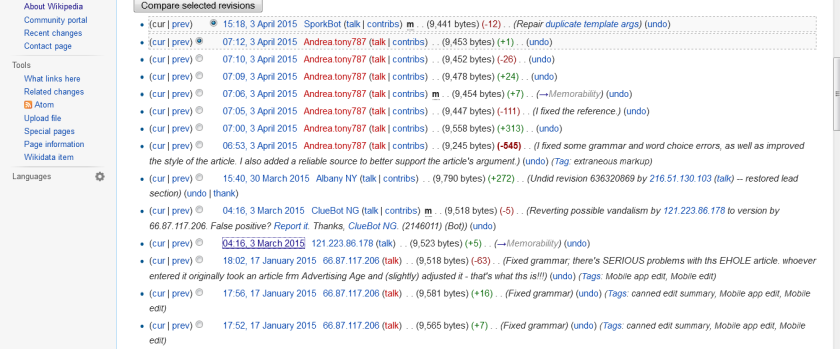“The whole is greater than the sum of its parts.”
– Aristotle
Most of us are familiar with Wikipedia, the “multilingual, web-based, free-content encyclopedia project supported by the Wikimedia Foundation and based on a model of openly editable content,” according to itself. Everyone with an internet connection can sign up to be a Wikipedia contributor; therefore, not all information found on Wikipedia is reliable and correct. This is the reason why most teachers and professors advise students not to use Wikipedia for researching purposes. However, we can’t deny that Wikipedia has its strengths and, used wisely, can be a great resource and social platform. Today I will talk about my experience being a Wikipedia contributor, or a Wikipedian, as I call it.
What makes Wikipedia special and innovative is that it is an open-source, free-for-all platform where people get to practice writing about topics of their interests. It fulfills the needs of non-scholars looking to share their knowledge with the world without having to go through formal procedures.
For example, from the research I’ve done on music in advertising, I am confident enough to share what I’ve learned with people in my community, not only in the country but around the world. Wikipedia allows me to create or edit articles quickly and globally at no cost. There are plenty of resources on the topic of music in advertising; however, very little of them are shared on Wikipedia. The main community covering this topic has been established, but don’t seem to put too much effort into enriching Wikipedia database. I picked this article, which provides a brief for my blog topic because it is still fairly raw in both content and style, which is easier for a beginner Wikipedian like me to contribute. I first started off with the grammar and styling errors, then moved on the content and added a reliable source collected from my blogroll to back up some of the article’s arguments. The coding system of Wikipedia is fairly simple, mostly because there are plenty of precedents on the site or in the article itself.
The second great thing about Wikipedia is that no one is alone. With a community of 24 million contributors, one can almost find someone with similar interests to co-write and co-edit articles. On the one hand, Wikipedia’s co-editing feature helps the contributors expand their social network and deepen their understanding of the subject. On the other hand, having multiple authors work on the same article also benefits Wikipedia itself as it gathers and synthesizes the opinion of different people, probably coming from different backgrounds, to form a neutral, non-biased voice.
Moreover, the awareness and pride of being part of the Wikipedian community also encourages contributors to write more responsibly and collaborate for the good of all, as demonstrated by Aristotle quote at the beginning of this blog post. There have been 50 revisions of the article I edited, written by 27 contributors including me. Most of us tried to get rid of the grammar errors and improve the style of the original article. Some added categories within the articles, which helps link it to relevant topics. Technical issues such as broken links or citations were also taken care of. Vandalism was found and fixed the same day.
Whenever there’s teamwork, there’s a question of whether the members cooperate well with each other. However, Wikipedia’s guidelines and the fact that everyone can see and revoke a revision at any time ensure that the latest version is likely to be the best one. Being able to contribute to Wikipedia not knowing how long that contribution will survive the criticism of other co-writers requires bravery and open-mindedness. The incentive of being a Wikipedian as discussed by scholar Stacey Kuznetsov is a sense of “accomplishment, collectivism, and benevolence.” In order to complete this goal, it is best that contributors phrase their opinions in a neutral voice and be patient when discussing with co-writers, especially when you write about issues that base heavily on personal taste like music in TV commercials. Last but not least, prepare to compromise and always practice goodwill.


